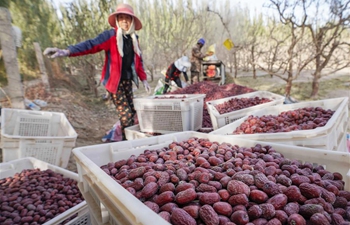HARARE, Oct. 31 (Xinhua) -- Zimbabwe's economy is projected to contract by 6.5 percent in 2019, but will turn around in 2020 on the back of ongoing economic reforms, Finance Minister Mthuli Ncube said Thursday.
This will be Zimbabwe's first negative growth in a decade as the nation grapples with a myriad of economic challenges.
He said the improved performance in 2020 was based on anticipated improvement in rainfall patterns after a drought this year, which should boost agriculture production and electricity generation.
The country is experiencing debilitating power cuts due to low power generation at Kariba South Hydro power station following a sharp drop in water levels at Kariba Dam.
The minister said improved foreign currency generation from mining as well as improved business confidence from the ongoing reforms should also spur economic growth next year.
He was addressing parliamentarians during a pre-2020 national budget meeting in the resort town of Victoria Falls.
Ncube is expected to present the 2020 national budget next week.
He said next year's budget thrust will be on transitioning the economy from austerity to growth, employment creation, growth and productivity, job creation and competitiveness.
However, the 2020 national budget and growth trajectory faced risks associated with the exchange rate, inflationary pressures, weak aggregate demand, infrastructure deficiencies, re-dollarization pressures and climate change, the minister said.
The country in June this year banned the use of the multiple currency regime, predominantly the U.S. dollar, which had been in use since 2009 and re-introduced the Zimbabwe dollar.
However, the local unit has been losing value against the U.S. dollar on the inter-bank market that was introduced in February, debuting at 2.50 to the U.S. dollar but now trading at 15.6 to the greenback as at Oct. 30, 2019.
The continued depreciation of the local unit has forced many traders and businesses to opt charging in the U.S. dollar, despite it being banned.
Mthuli said Zimbabwe needs to import 840,000 tonnes of grain after the drought left at least 50 percent of the country's population in need of food aid until the next harvest in April 2020.
He said as at Oct. 10 this year, the country had imported maize totaling 37,000 tonnes and had signed contracts for maize imports totaling 287,000 tonnes.
Zimbabwe requires about 1.8 million tons of maize for consumption annually but only managed to produce an estimated 776,635 tonnes in 2019.













